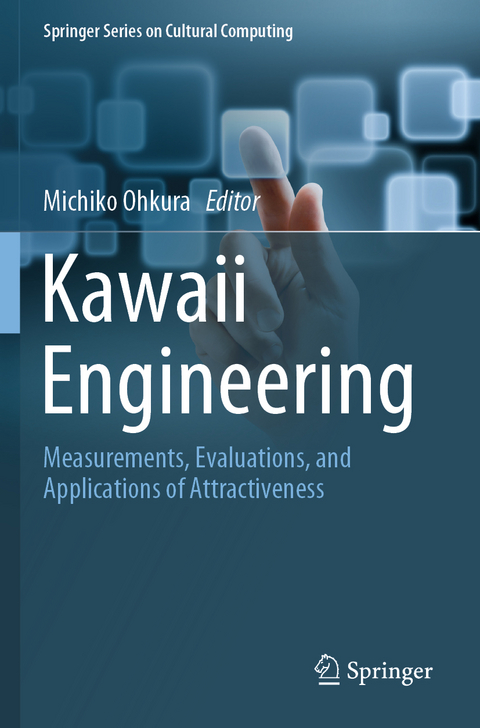
Kawaii Engineering
Springer Verlag, Singapore
978-981-13-7966-6 (ISBN)
Following the introduction of the background of kawaii engineering in Chapter 1, Chapters 2 and 3 describe experiments on the systematic measurement and evaluation methods for kawaii products and affective evaluation experiments. Chapter 4 proposes a mathematical model to identify the physical attributes that determine kawaii in motion. Chapters 5 and 6 explain research that uses biological signals and eye-tracking. After a brief survey of psychological research on kawaii and cuteness in Chapter 7, Chapters 8 and 9 introduce the use of spoons designed to stimulate the appetite of the elderly and the practical implementation of an emotion-driven camera. Chapters 10–14 explain experimental research that examines kawaii perception of people from various cultural backgrounds.
Kawaii Engineering will appeal to those who work on affective computing, product design, user experience design, virtual reality, and biological signals.
Michiko Ohkura has been a professor at the Shibaura Institute of Technology since 1999. Formerly, she worked at the Central Research Laboratory of Hitachi Ltd., and at other companies. She is a fellow of the Virtual Reality Society of Japan, a vice president of the Japan Society of Kansei Engineering, and a member of the Science Council of Japan. She is also a member of the Institute of Electrical and Electronics Engineers (IEEE) and the Association for the Advancement of Affective Computing (AAAC). Her research interests include interaction design, biological signals, and mathematical models especially from an affective point of view.
Part I. Introduction.- Chapter 1. Kawaii Engineering.- Part II. Systematic study on kawaii engineering.- Chapter 2. Systematic Measurement and Evaluations for Kawaii Products.- Chapter 3. Affective Evaluation for Material Perception of Bead-Coated Resin Surfaces Using Visual and Tactile Sensations - Focusing on Kawaii -.- Chapter4. Kawaiiness in Motion.- Chapter 5. Measurement and Evaluations of Kawaii Products by Biological Signals.- Chapter 6. Measurements and Evaluations of Kawaii Products by Eye Tracking.- Chapter 7. Meaning of “Kawaii” from a Psychological Perspective.- Part III. Applications of kawaii engineering.- Chapter 8. Kawaii spoons for senior citizens.- Chapter 9. Toward Practical Implementation of an Emotion-Driven Digital Camera Using EEG.- Chapter 10. Evaluation of Key Emotional Value for Saudi Women.- Chapter 11. Model of Kawaii Spoon Evaluations by Thai and Japanese.- Chapter 12. Model of Kawaii Cosmetic Bottle Evaluations by Thai and Japanese.- Chapter 13. Kawaii Perception of Artifacts Between Chinese and Japanese Cultures.- Chapter 14. How “Kawaii” Became the Key Concept of Our Tiny Electric Car.- Part IV. Epilogue.- Chapter 15. Editor’s Summary.
| Erscheinungsdatum | 17.08.2020 |
|---|---|
| Reihe/Serie | Springer Series on Cultural Computing |
| Zusatzinfo | 143 Illustrations, color; 24 Illustrations, black and white; X, 256 p. 167 illus., 143 illus. in color. |
| Verlagsort | Singapore |
| Sprache | englisch |
| Maße | 155 x 235 mm |
| Themenwelt | Kunst / Musik / Theater ► Design / Innenarchitektur / Mode |
| Mathematik / Informatik ► Informatik ► Betriebssysteme / Server | |
| Informatik ► Software Entwicklung ► User Interfaces (HCI) | |
| Sozialwissenschaften | |
| Technik ► Maschinenbau | |
| Schlagworte | affective design • biological signal • deep convolutional neural network • ecg • EEG • Emotion • exciting kawaii • Eye-Tracking • industrial product • Kansei Value • Kawaii • kawaii engineering • Likert Scale • mathematical model • physical attribute • positive and dynamic sensation • relaxing kawaii • Russell’s circumplex model • Virtual Reality • Visual Analog Scale |
| ISBN-10 | 981-13-7966-1 / 9811379661 |
| ISBN-13 | 978-981-13-7966-6 / 9789811379666 |
| Zustand | Neuware |
| Informationen gemäß Produktsicherheitsverordnung (GPSR) | |
| Haben Sie eine Frage zum Produkt? |
aus dem Bereich


